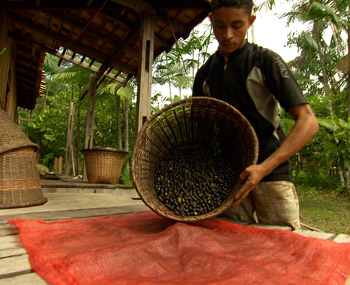
Wild Wealth
Title (Spanish): Riqueza Viva
Title (English): Wild Wealth
Country of Origin: USA
Year of Completion: 2012
Duration: 35 minutes
Format: DVD
Language: Spanish
| Sunday 09/09/2012 -- 7:00 PM |
|---|
FUNGLODE Auditorium |

Film SynopsisWild Wealth, is a documentary that depicts the wealth of biodiversity in Latin America and the Caribbean in images not previously seen. Produced by the Inter-American Development Bank (IDB) and National Geographic.
The film crews traveled from the Andes to the Amazon to tell five stories that illustrate the need to protect the region's natural resources. With striking images, the film shows why Latin America and the Caribbean is considered a biodiversity superpower. Six of the world's 10 most biodiverse countries are in the region, which is home to 33 percent of the world's mammals, 35 percent of reptiles, and half of tropical forests.
The documentary also recounts how communities work together to maintain a balance between economic, environmental, and social objectives, conserving in this way the environment and the region's resources for future generations and using it wisely as a source of economic development.
Wild Wealth presents examples of sustainable biodiversity conservation in the areas of tourism development, agriculture, fisheries, job creation, and environmental protection.
In Guanacaste, Costa Rica, the documentary shows how a first class resort located near a national park helps to protect biodiversity while generating jobs for local people.
In the heart of the Brazilian Amazon, it tells the story of a cosmetics company that works with indigenous communities to market açaí fruit in a sustainable and responsible manner.
In the Andes, it presents the experiences of local farmers who produce organic quinoa, a traditional grain, and export their crop to international markets to create new sources of employment in the highlands.
On Ecuador's Pacific coast, the documentary shows how small-scale and industrial fishers are seeking to put into practice sustainable practices for tuna fishing as a way of ensuring productive catches without depleting limited resources.
Finally, the documentary describes how Rio de Janeiro's government is managing the
forest areas around the city to control erosion and flooding and establish a balance between
urban life and the protection of vital green spaces.
Established in 1959, the IDB is the largest source of financing for development in
Latin America and the Caribbean. The Bank provides loans, grants, technical assistance and
conducts research on key issues for social and economic development in the region.
Its shareholders are 48 member countries, including 26 Latin American and Caribbean
borrowing member countries, which have a majority ownership of the IDB.
Film Credits:
Producer/Writer: David Hamlin
Executive Producers:
Jared Lipworth & Pamela Murphy
Editor: Dan Evans
Director of Photography: David Linstrom
Host/Narrator: Salvatore Vecchio
Production Managers: Nicole Hughes, Patrick Hare, Chrystal Williams
Coordinating Producer: Monica Pinzon
Development Producer: Jaime Garcia Alba
Composers:
Lenny Williams, Chris Biondo, Robert Squier
Assistant Producers:
Carolina Jaramillo, Pablo Picon
Additional Camera:
Nicholas Donnelly, Joaquin Martínez
Director's Biography:
David Hamlin is a multiple Emmy Award winning filmmaker and Executive Producer. He's responsible for over 100 award-winning Specials, Series and New Media projects for the National Geographic Channel, NBC, PBS, other broadcasters and NGO's.
Hamlin has travelled the world on numerous outdoor expeditions and TV productions. He honed his storytelling skills while kayaking, climbing and filming in every environment ranging from the Congo Basin to the Karakoram to the Amazon to the Arctic. Since joining National Geographic in 1996, his work has
focused on pressing issues such as wildlife and wilderness conservation, sustainable resource management, climate change and economic inequality.
Hamlin began his unorthodox career path as a professional puppeteer. While at Dartmouth College, he received fellowships including teaching 2nd Grade in Jersey City, NJ and writing scripts for "Sesame Street." After college, he merged these skills as a puppeteer touring northern New England. When he was asked to join a National Geographic kayaking expedition circumnavigating South Korea, a new
career was born as a filmmaker. Hamlin produced his first national broadcast TV segments for NBC's coverage of the Seoul Olympics.
Hamlin received his MFA at USC's School of Cinema-Television, where he was awarded the University's prestigious President Sample award recognizing him as an emerging leader in his field. Several of his USC graduate films were broadcast on PBS and his final project, "Stolen Days," documenting the lives of young adults (including his brother) battling Stage IV cancer was nominated for a Student Academy Award.
After graduation, Hamlin wrote/produced/directed interactive documentary installations for museums and educational organizations. One exhibit, "Understanding the Los Angeles Riots" commissioned by the Museum of Tolerance in LA, was chosen the Best Interactive Exhibit of the Year by the American Association of Museums.
Since 1996, Hamlin has worked at the National Geographic Society producing content in genres ranging from earth/marine sciences to adventure to paleontology to space exploration. He's been awarded 3 National Emmys, 7 nominations and numerous festival wins.
Recently, Hamlin led the 100+ person team producing National Geographic's most ambitious TV Series in history, "Great Migrations." This global media event combined broadcast television, magazine, books, web, and curricular components. An unprecedented initiative, 'Migrations' stressed the dramatic journeys waged everyday by countless creatures -- and the emerging obstacles presented by our changing planet.

Community in Action!
Supporting grassroots organizations and communities
Among the goals of the DR Environmental Film Festival (DREFF), is to include and support grassroots organizations and communities, schools and young people in general.
Marcos Diaz
A real Universal Community leader and spokesman for the core values of the UN Millennium Development Goals as it is the Dominican swimmer Marcos Diaz. He will meet a group of youth, who will have a swimming competition, at La Caleta. The expected goals of this activity is to offer an opportunity to youth of disadvantaged areas to interact with Marcos, and to get a better understanding for the role model that Marcos represents for Dominicans and the rest of the world, as well as a better understanding of the sea and this protected area of La Caleta.For more details about Marcos Diaz visit Dominican Get-Together in the Big Apple
Trivias - Dominican Encyclopedic Dictionary of the Environment
to Promote DREFF Video






